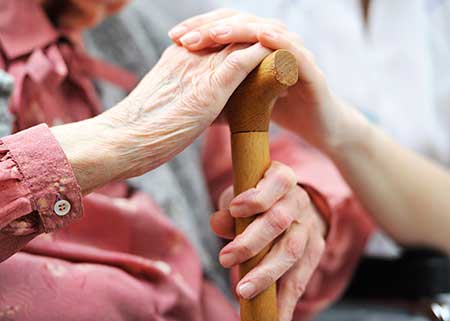News
The information presented on this page may be outdated. It may refer to situations which have changed or people who are no longer affiliated with the university. It is archived as part of Mississippi State University's history.
Survive holiday grief like marathon training

Experts from Mississippi State University recommend that those coping with the loss of a loved one slow down amid the hustle and bustle of the season.
11/24/2014
By: Vanessa Beeson
"Grieving is less a sprint and more of a marathon," said Joe Wilmoth, an associate professor in the MSU School of Human Sciences and researcher with the Mississippi Agricultural and Forestry Experiment Station. "And like a marathon, the grief process requires preparation, perseverance and patience."
Wilmoth said communication is critical when preparing for the first holiday season without a loved one. He recommended discussing the holidays with family members and deciding which traditions to honor and which traditions might be too physically or emotionally taxing that first year.
"Be realistic," Wilmoth said. "Decide what you can and can't handle during the holidays and make sure friends and family know."
Wilmoth said perseverance is important as well.
"Exercise, nutrition and rest are keys to maintaining your emotional strength," he said. "The holidays can be draining, and grief becomes even more complicated when you are tired."
Wilmoth said it is vital for the bereaved to follow internal cues.
"As someone experiencing grief, be aware of what is happening physically, emotionally and mentally," he said. "Listening to and honoring your own needs first is critical during the acute grief phase."
David Buys, MAFES researcher and Extension health specialist with the MSU Department of Food Science, Nutrition and Health Promotion, said grief is different for everyone.
"Research indicates that grief is an individualized process, which requires an individualized approach," Buys said. "One of the most important things to understand is that grief varies from person to person. There is no single right way to grieve."
Patience is paramount for individuals and families as they embrace the grieving process, Buys said.
"Be very mindful and specific in offering help. Instead of asking someone what they need, offer to do something specific," Buys advised family members. "Don't impose expectations. Extend invitations, but don't make loved ones feel guilty if they choose to say no."
If individuals become concerned that their grief is abnormal, he encouraged them to discuss grief resources with a counselor or even with their health-care provider. Engaging in a support group, like Walking through Grief or Grief Share, both national organizations with local chapters, can help individuals face challenges and rebuild after the loss of a loved one. Also, funeral homes offer more than just final care for people who have died; they often have grief resources available for families.
"Lean into your grief," Buys said. "Pain and grief are normal. Crying is OK. It's also OK to laugh. Go with the flow."
View More News